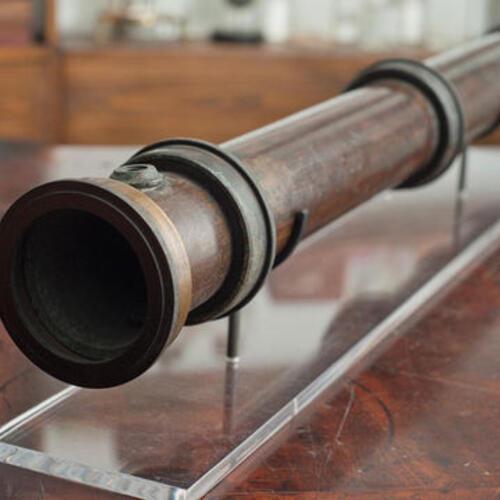Date: 1861
Place made: Royal Institution Basement & Alps Cabin
Alternative name: Greenhouse gases experiment
Materials: Glass, copper, iron, wax
Measurements: W: 698mm, diameter: 85mm

Description
This tube is part of a collection of apparatus which was first created and joined together in 1859 by John Tyndall, Royal Institution Professor of Natural Philosophy when he was beginning to study the capacity of various gases absorbing or transmitting radiant heat.
Tyndall had been at the Royal Institution since 1853, where he became a friend of Michael Faraday and entertained and instructed fashionable audiences with his brilliant lecture demonstrations. An outstanding experimenter, particularly in atmospheric physics, he next took on this challenging work.
Tyndall set about examining the transmission of both radiant heat and light through various gases and vapours. He discovered that water vapour absorbs much more radiant heat than the gases of the atmosphere and then argued the importance of atmospheric water vapour in moderating the Earth’s climate, that is, in the natural greenhouse effect.
The greenhouse effect works as follows: most of the Sun’s energy is radiated as visible light, this is not absorbed by the atmosphere and passes through to warm the Earth. The warm Earth radiates heat back into the atmosphere as infrared radiation, which is avidly absorbed by atmospheric water vapour and carbon dioxide, trapping the heat and preventing the Earth from freezing.
Where can I view this?
This object is currently on display in the Lower Ground Floor of the Royal Institution in the Faraday Museum.
